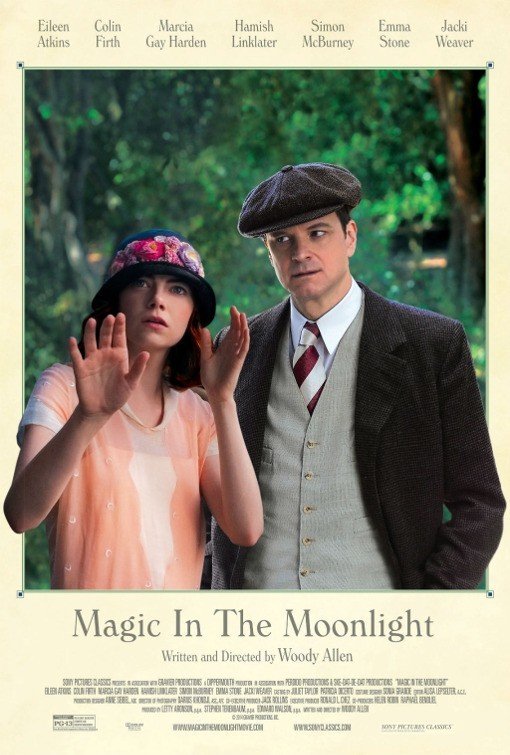“The Issue of Prayer and God’s Plan for Mankind”

| None | Light | Moderate | Heavy | |
|---|---|---|---|---|
| Language | ||||
| Violence | ||||
| Sex | ||||
| Nudity |
What You Need To Know:
MAGIC IN THE MOONLIGHT is extremely well done and often funny. It also has some fun twists and great dialogue. However, at the end, the movie eventually endorses Stanley’s atheist, materialist worldview. Only one line of dialogue really challenges that worldview. Because of its rather pat endorsement of atheist materialism, MAGIC IN THE MOONLIGHT ultimately is abhorrent, despite its high entertainment quality and lack of any really crude or lewd content.
Content:
(HHH, ABABAB, Ro, OO, B, L, V, S, A, D, MM) Very strong anti-religious, anti-supernatural humanist worldview dismissing the idea of an afterlife with Romantic elements promoting emotional love as the only real mystical “magic” in life, including man rejects belief in God and prayer as silly and stupid, with strong occult references including séances where a magician tries to expose a medium that his skeptical “rational” mind tells him always is false and a fraud because the supernatural world cannot really exist; six obscenities (“d” or “H” words) and three light profanities; no violence but character is sad to have an auto accident needing surgery; romance, but no sex, although it is revealed an older woman had a sad affair with a married man in the past because he decided not to leave his wife; no nudity; alcohol use; smoking but no drugs; and, lying, deceit, fraud but rebuked.
More Detail:
The movie opens in 1928 in Berlin. British magician and committed atheist Stanley Crawford poses as his alter-ego, a Chinese magician, to amaze an audience with his tricks. After the performance, an old magician friend, Howard Burkan, asks Stanley to come to Southern France and expose a young medium named Sophie. Sophie and her mother are about to bilk a family out of part of their fortune. Also, the family’s young handsome but vacuous heir, Brice, is smitten with Sophie and wants to marry her. Howard tells Stanley that, despite his own knowledge, he was unable to determine how Sophie was accomplishing her occult tricks. Stanley, however, prides himself on being able to debunk any psychic anywhere and agrees to help expose Sophie.
When they get there to the family’s estate on the Riviera, however, Sophie is able to escape all of Stanley’s “rational,” scientific attempts to reveal her alleged fakery. Could Sophie be real? Is there really an afterlife? If so, it would upset everything this hardcore atheist believes. Making matters worse for Stanley is that he seems to be falling for this beautiful, interesting younger woman, even though he’s romantically involved with another hardcore, “rational” atheist like himself.
MAGIC IN THE MOONLIGHT is extremely well done and often funny. It also has some fun twists and great dialogue that will captivate most viewers. Admittedly, however, the second act seems to drag a little bit. The twists at the end make up for this problem. Or, at least they seem to do so.
At any rate, MAGIC IN THE MOONLIGHT has some interesting, entertaining debates concerning atheism versus religion and mysticism. In the end, however, since Woody Allen is himself a committed atheist, the movie comes down firmly on the side of atheism. Thus, in the end, it eventually rejects all religion, not just the occult. This atheism is tempered by the movie’s contention that, although materialist science is the ultimate truth, there’s a mysterious “magic” in romantic love between a man and a woman. Humorously, Stanley’s hardcore atheist materialism doesn’t let him really understand this magic, but he comes to accept it nevertheless.
Despite the movie’s ultimate endorsement of a hardcore atheist worldview, one piece of dialogue undercuts this worldview and gives hope to believers in God. At one point, Stanley is encouraged to start praying for something. In the middle of his prayer, he stops and rejects the whole idea of praying. Later, however, Sophie points out to Stanley that, although he stopped praying, another person went through with their prayer for the very same thing, and the prayer was answered in a positive way. So, she points out, there’s really no reason for Stanley to believe that prayer doesn’t work.
Of course, as any intelligent God believer knows, although God may answer a prayer request with a big fat “No”, praying to God for something is a positive end in and of itself because it gives us an attitude of being dependent on God. Thus, Jesus Matthew 6:9-13 encourages us to ask God for “our daily bread,” as well as to ask Him to “deliver us from evil.”
These basic points of Christian, biblical theology, which are perfectly rational and reasonable, are, apparently, lost on atheists like Woody Allen. In fact, most atheists the MOVIEGUIDE® staff encounters appear not to seem familiar with such arguments. Certainly, however, this new movie by Woody Allen, for the most part, seems to stack the deck in favor of hardcore atheist materialism. Strangely enough, MAGIC IN THE MOONLIGHT accepts the mystical, mysterious or “magical” quality of romantic love. It accepts this as a human truth even though the movie’s atheist materialism clearly can’t account for it. Christianity, however, has a broader view of logic and truth. This view, which comes from the Bible, teaches us that a Rational Creator created man and woman as helpmates for one another. Thus, romantic love isn’t a totally mysterious, irrational event but a perfectly logical, and even scientific, part of God’s rational plan for mankind.
Because of its rather pat endorsement of atheist materialism, MAGIC IN THE MOONLIGHT ultimately is abhorrent, despite its high entertainment quality and lack of any really crude or lewd content.


 - Content:
- Content: 
